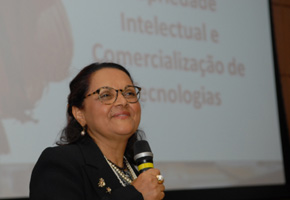

Elza Fernandes de Araújo, coordinator of the Minas Gerais Intellectual Property Network speaks about the challenges of managing innovation and intellectual property (photo:Eduardo Cesar)
Coordinator of the Minas Gerais Intellectual Property Network speaks about the challenges of managing innovation and intellectual property.
Coordinator of the Minas Gerais Intellectual Property Network speaks about the challenges of managing innovation and intellectual property.

Elza Fernandes de Araújo, coordinator of the Minas Gerais Intellectual Property Network speaks about the challenges of managing innovation and intellectual property (photo:Eduardo Cesar)
By Mônica Pileggi
Agência FAPESP –The challenges of managing innovation and intellectual property were the topic of a speech given by Elza Fernandes de Araújo, coordinator of the Minas Gerais Intellectual Property Network (RMPI) at the Seminário Inova São Paulo (Innovate São Paulo) held on November 29 at the auditorium at FAPESP in São Paulo.
Created in July 2003, RMPI has 31 members – 27 science, technology and innovation organizations and four affiliated institutions – and is jointly coordinated by Universidade Federal de Viçosa (UFV) where it is headquartered and by Universidade Federal de Minas Gerais (UFMG).
According to Araújo, who is a UFV professor and an adjunct innovation aide at the Minas Gerais State Foundation (Fapemig), RMPI’s aim is to promote economic development and entrepreneurship, protect knowledge and train human resources.
“[RMPI accomplishes] this through scientific and technological innovation, with the main actors being the business sector, consumers, support agencies, universities, research institutions and mainly intellectual capital,” he said.
“All of the intellectual capital of a research institution or a company serves to bring together ideas. We have to share these ideas and work with them as needed – either internally or through partnerships. Nevertheless, the greatest challenge of the network is to elaborate projects that generate new knowledge. For this reason, the management of innovation and intellectual property is fundamental,” she said.
Araújo also recalled that in addition to disseminating and implementing policies for intellectual property and for technology transfer and innovation, the role of the intellectual property network in Minas Gerais was to act as a facilitating agent between research institutions and companies.
“When we speak of interacting with companies, working via networks allows us to obtain good research instruments for the services we render – consulting, sharing permission for use, technology transfer – services that RMPI’s Technological Innovation Centers (NITs) offer in the corporate area.”
According to the coordinator, the NITs, whose responsibility is to generate the intellectual property and innovation policy of member institutions, work with these institutions to meet their requirements related to this activity.
Araújo stressed that as a result of the efforts undertaken by the Minas Gerais network, the submission process for patents had become more agile, resulting in 632 national patent submissions and 121 international patent submissions. Since the network was created in 2003, considering all of its members, 148 patent requests were filed, 79 of which were granted.
Other points highlighted regarding RMPI’s activities were the training of multipliers in the topic through courses and workshops on innovation management, and the facilitation of the implementation of programs, services and projects for the intellectual property field.
Republish
The Agency FAPESP licenses news via Creative Commons (CC-BY-NC-ND) so that they can be republished free of charge and in a simple way by other digital or printed vehicles. Agência FAPESP must be credited as the source of the content being republished and the name of the reporter (if any) must be attributed. Using the HMTL button below allows compliance with these rules, detailed in Digital Republishing Policy FAPESP.





